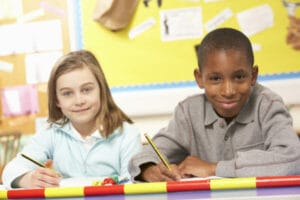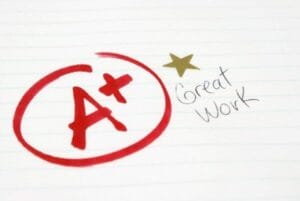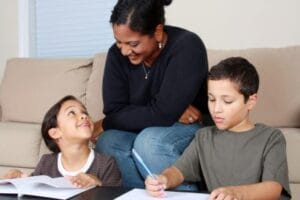The National Curriculum : Is it Enough?

The National Curriculum. Do you know what it is or what’s in it?
Now, I’m not writing this to explain The National Curriculum to you or tell you what it is your child is learning at school. I’m really writing this because I wonder if it’s enough.
Have you ever thought about this?
With our busy, hectic lifestyles, we have become quite comfortable in thinking that what our children learn at school gives them a solid foundation. Hopefully, such learning will equip them with what they need to progress in all areas of their life.
The National Curriculum is written by experts and they know what our children need to learn to get the best out of their lives and the education system. True or false?
There will be many opinions on this and I wanted to share mine with you. It would be great to hear what you think in the comments section below.
We are all aware that teachers have an increasingly growing workload. The few hours they have a day with thirty-odd children is extremely difficult. They have to deal with tantrums, fights, quarrels and the hormonal changes our children go though as they approach the end of their primary learning. So, I think to expect them to squeeze in more than the contents of The National Curriculum is pushing it.
If you are like me, you will agree that learning never stops and every experience that our children encounter is an opportunity for learning. This could be learning new information or learning something about themselves. It’s all part of the process and shapes our children into the adults they will become.
So, whose responsibility is it then that our children continue to learn beyond The National Curriculum? You will be surprised to hear me say this but that responsibility is not just ours, the parents, but also the responsibility of our children.
Subjects on The National Curriculum only touch the surface
If you take a look at The National Curriculum, you will notice a list of subjects covered and various tests that your child will undertake while they are at school. These include phonics screening and SATs.
When you look deeper into those subjects, you begin to realise that they only really just touch the surface. Let me give you an example. Music – I know my children have had a go at the recorder, perhaps bashed a few drums, tried the violin and even danced along to music videos.
So what have they actually learnt? Did they learn to read music? No. Were they able to learn to play a particular instrument? No. Did they take part in a performance to display the skills they learnt in their music session? No. So, what did they learn?
I will leave you to dwell on that answer for yourself. My point is this, if you want your child to pick up an instrument, you will have to take on that responsibility and get them to some classes, and your child’s responsibility will be to make sure they put in the practise!
The National Curriculum is limited
My next point is this, there are plenty of topics I would like my children to learn about that are not on The National Curriculum at all. One example of this is the British involvement in the slave trade. If there is any mention of it, it’s just ‘touched upon’. There isn’t the opportunity for children to ask questions and debate the actions of the British and its impact on many, many lives.
Again, if you feel that it’s important for your children to learn certain aspects of history not covered in school, you may just have to be the one that educates them about it.
[irp posts=”7644″ name=”How to Help your Child Learn Through Play”]Learning about Diversity and Culture
It is difficult to teach all school children about the different cultures that make up our diverse country. However if your children, like mine, have a mixed heritage, you really want them to learn about where they are from, their ancestors and their family history, cultural traditions and religions.
No one is better equipped to teach them those things except you. My children have been lucky to be able to share and talk about who they are and provide artefacts at show –and-tell from the countries that myself and their dad is from. Other children were really interested and allowed them to learn something the school may not have had the opportunity to teach.
Real Life Experiences
No amount of schooling will provide your child with ‘real life’ experience. Children get many word problems in maths and scenarios set up to mimic real life but it’s never going to beat actually getting out there and doing it themselves.
This is where I really believe children need to get out and actually face the day-to-day events of life. I have allowed my children to pay for small amounts of shopping, allowing them to interact with the person at the counter, handle money and check their change. Role-play is good but ‘real life’ is a million times better and it helps to develop confidence and independence.
Lack of resources at school and government cuts mean that learning at school is predominantly via photocopied sheets of paper and images. Remember we learn through all our senses. I think that’s why my children love science so much because they are able to do experiments and actually see cause and effect at first hand.
With our busy lives, everything is a rush. I think it’s important to stop. Allow children to look around, touch and feel object they see around them… don’t worry; I can just hear those mums saying, ‘No! The bacteria, the dirt… where are the antibacterial wipes??’
Oh my, it’s really ok. Don’t you remember playing in the dirt? I know I did and I’m just fine! If you are lucky enough to go away on holidays by the beach, pick up some shells, feel the sand, play in the rock pool, look for any life forms, the kids love it. But do be careful just in case you are in a store and your children decide to pick up something that breaks if it’s dropped!
[wd_ads advert=”8028″]
Learning at Home
It doesn’t all have to be outdoors either. We have plenty of debates and discussions at home about various things and it really helps children learn certain social etiquettes. For example how to turn-take, how to make yourself heard and how to think critically.
Home learning could also be practical. Many of our young people are unable to cook and there is a growing culture of take-aways and eating out. Cook with your child, it’s such an important skill to help children learn how to look after themselves and how to prepare healthy foods.
Education is compulsory but school is not !
I think many home-schoolers will agree with me. If you are a home-schooler, I am sure that one of the reasons you decided to home-school was because of the narrow education on The National Curriculum.
One thing I’ve learnt is that in the UK education is compulsory but school is not!!
I don’t home school my children but I know if I had the opportunity and felt confident enough to, I would probably consider it.
On the other hand, there is nothing wrong with sending our children to school but we must work hard to broaden their education.
I hope this has got you thinking, if it has, it would be great to know what your thoughts are. Let me know 🙂
Join our mailing list
Sign up to our Emailing List & Get the Latest Information and Offers on Resources
Thank you for joining !
Something went wrong.




